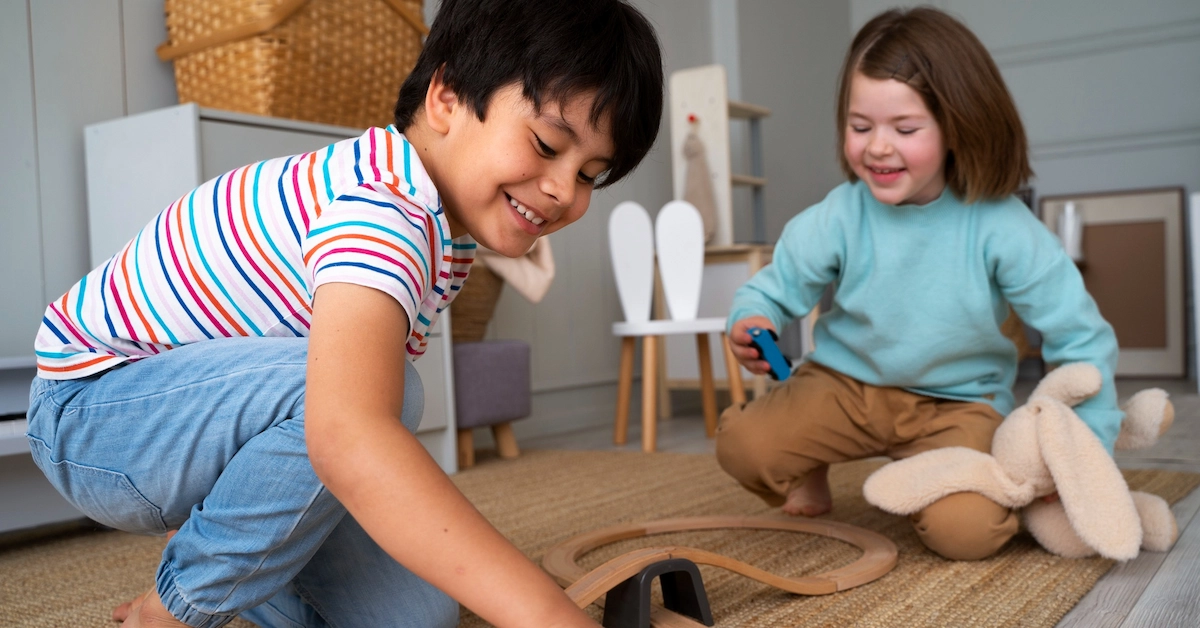Playdates are a meaningful part of a child’s growth. At ages 5 and 6, children are learning how to communicate, share, and cooperate with others. Through play, they practice essential social skills that shape how they relate to friends, teachers, and family.
But beyond the laughter and creativity, playdates also reflect a deeper Christian value of friendship and fellowship. God designed us to live in community, to care for one another, and to grow through relationships.
As it says in Proverbs 27:17, “As iron sharpens iron, so one person sharpens another.” For children, playdates are one of the first ways they experience that truth, learning to give, take turns, and show kindness.
Whether your child is shy or outgoing, structured or imaginative, these simple playdate ideas can help them connect with others in joyful and meaningful ways.
Why Playdate Activities for 5–6-Year-Olds Matter
At this age, all children begin to understand friendship in a deeper way. They start recognizing others’ feelings, taking turns more willingly, and developing empathy. Playdates give them the space to practice:
- Cooperation and teamwork: learning to work together toward a goal
- Problem-solving: finding ways to resolve small conflicts on their own
- Communication: expressing ideas and listening to others
- Kindness and empathy: showing care, forgiveness, and patience
Read Also: Why Outdoor Play in Early Childhood Matters?
6 Playdate Ideas to Keep Kids Entertained and Connected through Faith
For parents, hosting or arranging playdates also provides valuable opportunities to teach hospitality and gratitude, both important Christian virtues. When children learn to welcome friends into their home or be respectful guests, they’re learning what it means to love others well.
1. Creative Play: Craft Together
Set up a small craft station with colored paper, glue, stickers, and crayons. Encourage children to make friendship cards, paper crowns, or simple collages. Crafting helps children express themselves and learn to share materials, take turns, and admire each other’s creations. You can even include a faith-based theme, like drawing things they’re thankful for or making a “God’s Creation” collage.
2. Active Play: Backyard Obstacle Course
Turn your backyard or living room into an adventure zone. Use chairs, pillows, and boxes to make tunnels, jumps, and balancing paths.
Active play promotes coordination, teamwork, and healthy competition. You can add a cooperative twist by setting challenges that require them to help each other succeed, like passing a ball without dropping it or crossing the “river” together.
3. Pretend Play: Role-Playing Adventures
Children love to imagine! Give them simple costumes or props and encourage them to act out stories like running a pretend store, being firefighters, or exploring space. Pretend play boosts creativity and communication while allowing children to experiment with empathy by “stepping into someone else’s shoes.”
4. Quiet Play: Storytime Sharing
Invite children to bring their favorite books and take turns “reading” them aloud or describing the pictures. You can also tell a short Bible story together and talk about what they learned.
Quiet play moments help children listen attentively, reflect, and practice patience. These are skills that are just as valuable as active ones.
5. Cooperative Play: Build Something Together
Provide building blocks, LEGO sets, or recycled materials like cardboard and tape. Challenge them to build something as a team, like a tall tower, a zoo, or a pretend city. This type of activity teaches collaboration, patience, and creative problem-solving. When children celebrate their creation together, they learn the joy of shared accomplishment.
6. Board Game Bonding: A Perfect Playdate for Lasting Friendship
Gathering the children around the table for classic board games is a simple, perfect playdate idea to keep kids entertained while teaching patience, teamwork, and grace. Whether for little kids or older children, these structured activities encourage kindness and fair play, turning fun into faith-filled learning.
You can also invite other parents to join or guide the game for extra connection and quality time. Just don’t forget to check for any food allergies before serving snacks. Through shared laughter and friendly competition, children learn that true joy comes not only from winning but from playing with love and gratitude.
Read Also: Foster a Growth Mindset for Learning: What Is It and Why Is It Important?
 Teaching Children to Be Good Hosts and Guests
Teaching Children to Be Good Hosts and Guests
Playdates are a perfect opportunity to guide children in the art of hospitality, something the Bible often celebrates. Parents can teach their children to:
- Be welcoming: Greet friends warmly and offer to share toys.
- Be considerate: Take turns, listen, and respect others’ choices.
- Be thankful: Say “thank you” to hosts and show appreciation.
In turn, when visiting someone else’s home, children can learn to be polite guests—asking before using things, helping tidy up, and saying goodbye with gratitude. These small acts plant seeds of good manners and genuine kindness that will grow with them into adulthood.
As Romans 12:10 reminds us, “Be devoted to one another in love. Honor one another above yourselves.” Through everyday moments like playdates, children begin to live out this verse, learning what it means to honor and love others with humility and joy.
Read Also: How to Build Resilience in Children through Playtime
Play Dates with Purpose
Playdates may seem simple, but they offer far more than entertainment. They are opportunities for growth in friendship, faith, and character. For younger kids in the 5–6 age group, every shared laugh, board game, or fun activity helps shape their understanding of what it means to care for others and live in community.
Even a few hours of play, whether at a local park or during indoor playdates, can encourage positive social interactions and keep children entertained while they build lasting bonds with their friends.
We believe that learning extends beyond the classroom. Thus, by encouraging fun activities, creativity, and fellowship, we nurture young children who not only grow in knowledge but also in compassion, empathy, and faith.
Through these moments, parents can play an important role in parental involvement, helping teach kids about kindness, sharing, and cooperation in social situations that strengthen both friendship and self-confidence.
So the next time you plan your next playdate, see it as a small step toward raising kind, confident, and Christ-centered individuals who bring joy to the world around them. Whether it’s a fun way to connect through outdoor activities or a simple baking party with a little one, a successful playdate can become a meaningful expression of love, joy, and community.
Read Also: Emotional Regulation Activities for Teens to Foster Mental Well-Being
Choosing a Play-based School
While play is something children do for fun, it’s also how they learn best. Our Play-based Learning approach in Kindergarten takes the same wonder and curiosity children express during Playdate Activities for 5–6 Year Olds and turns it into meaningful learning experiences that inspire both the heart and the mind.
When children are involved in engaging activities like simple science experiments, creative art projects, or collaborative teamwork, they learn to ask questions, solve problems, and work joyfully with others. Teachers use a keen eye to guide these moments, ensuring that every friend stays engaged and that learning remains filled with discovery, growth, and grace.
Just as playdates teach children to care, share, and cooperate, SPH’s classrooms nurture those same values through play that’s filled with purpose. It’s where learning feels joyful, friendships deepen, and children begin to see how God is present in every part of their world.
Whether it’s a rainy day indoors or a moment outdoors exploring playground equipment, every opportunity to play becomes a chance to create, grow, and reflect God’s love in action. See the benefits of play-based learning in this article.
Ready to See Play in Action?
If you believe that play can be a path to both knowledge and character, it’s time to explore how this concept comes alive at Sekolah Pelita Harapan (SPH), one of the most renowned preschool Jakarta.
As an international school in Indonesia grounded in Christian values, SPH is dedicated to helping children flourish academically, socially, and spiritually from their earliest years. Discover a learning environment where every activity is designed with purpose, every child is seen and loved, and faith becomes the foundation for joyful, lifelong learning.
Visit SPH today and see how purposeful play helps children grow in wisdom, creativity, and Christ-centered confidence.









